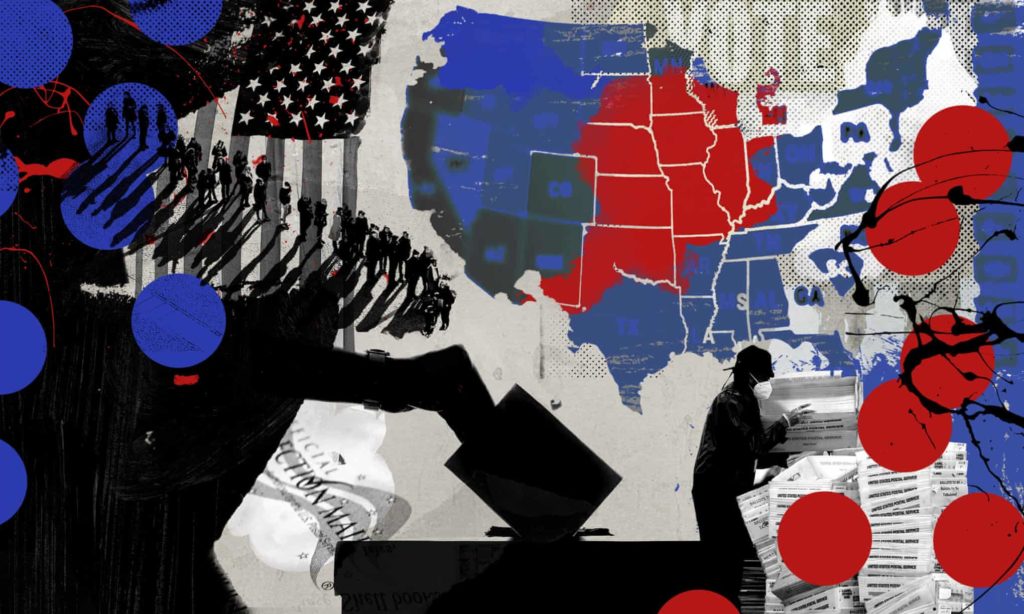Whatever else emerges from the US’s 2020 election, one thing is clear: it has not delivered a comprehensive repudiation of Donald Trump. The shock of 2016 has not been undone. There is nothing in the result to expiate the humiliation of the last four years, the disgraceful vulgarity and illegality. Even if Joe Biden is ultimately sworn in as president, the fact that Trump was not booed off the greatest stage in world politics in disgrace will be hard for Biden’s supporters to come to terms with. This is an inconvenient truth not for the US alone, it has implications for the rest of the world too.

Rather than a rejection of Trump, the election results reshuffle the finely balanced and deeply polarised configuration that has prevailed in American politics since the days of Bill Clinton in the 1990s. As in 2016, Trump lost the overall vote, but he continues to command overwhelming majorities in small-town and rural white America. Despite his vituperative hostility towards immigrants, Trump made remarkable gains among the rather diverse group crudely lumped together under the label Latino. Confusingly, he did well not only with anti-socialist communities of Cubans and Venezuelans in Miami, but with Mexican-Americans in Texas too. And he continues to garner a majority of votes from white women and white men of all backgrounds.
In the meantime no one, either inside or outside the country, should be under any illusion about the scale of the nationalist and xenophobic electoral bloc. The GOP has lurched into the territory of Viktor Orbán and Recep Tayyip Erdoğan and, nevertheless, commands solid support. Indeed, for a sizeable minority of the electorate, it is precisely the stridency of Trump and the GOP that appeals. They love Trump’s aggression, and his gleeful slaughter of liberal sacred cows. Now he has modelled the style, there will be plenty of others who will want to follow.
In a divided country, virtually every facet of reality is seen through a partisan lens. Not unreasonably, the Democrats tried to make the election into a referendum on Trump’s handling of the coronavirus crisis. But that did not prove to be a winning card. Almost half of Americans did not agree that Trump’s disastrous and irresponsible performance disqualified him from the presidency. This hardly bodes well for the effort to gain control of the disease, which would be the first task of a Biden administration.
If there is no collective will to take preventive action, then everything continues to ride on a magic bullet: a vaccine. But even that will not guarantee success. Opinion polling suggests that no more than a bare majority will agree to be vaccinated, with Republican-leaning Americans particularly resistant. The implication is that the US will limp along, not effectively controlling the outbreak and going through repeated lockdowns. The impact on communities and small businesses is likely to be devastating.
With progress blocked, the US election could entrench the poisonous status quo
Even assuming the virus can be mastered, a Biden administration would face an uphill political battle. Its formidable foes are the GOP in Congress, led by Mitch McConnell, the sulphurous boss of the Senate Republicans. Ahead of the election, riding a wave of over-optimism about the likely result, Nancy Pelosi played a dangerous game. The House speaker held out for a gigantic second stimulus package in excess of $2tn, but no “blue wave” swept the Democrats to control of Congress.
Now, with a diminished majority, Pelosi will have to return to the bargaining table to negotiate with McConnell. To the pleasure of Wall Street, he has announced that he is willing to make a deal, but this is an ominous sign. Any package that McConnell will agree to is more or less guaranteed not to meet the social crisis facing tens of millions of unemployed Americans, and struggling cities and states across the country. And yet, to save the economy from catastrophe, the Democrats may well be forced to accept McConnell’s terms.
However necessary, any deal with McConnell should be regarded as a poison pill. Every item of Biden’s progressive agenda – health, childcare and education – would be on the block. The wider world would be pleased to see a Biden administration reverse Trump’s decision to exit the Paris climate agreement. But any talk of a Green New Deal would likely be cut off at the knees. The Republicans like to talk about infrastructure but in four years in office, Trump never delivered an investment programme. If Senate Republicans were won over to a Biden green energy plan, you can count on it being tailormade for the business lobby. There is no chance whatsoever that the Senate would grant Biden the formal ratification of the Paris agreement, a legal victory denied to Barack Obama as it was to Bill Clinton over the Kyoto protocol.
This would leave the United States unable to credibly commit to carbon neutrality. The progress of technology and the falling cost of renewable energy may be the trump card, but a technical fix can only take you so far. Deep decarbonisation may in due course open the door to a new green growth model. But, in the medium term, it requires painful structural change that will have to be initiated from the top down.
Any progress in the next four years would depend on administrative makeshift and painful compromise. The Obama administration delivered a masterclass in both the potential and the limits of that kind of governance. A Biden administration would no doubt benefit from this experience, but it would face what may be Trump’s most formidable legacy: a court system packed at every level with pro-business, anti-regulation judges. In a single term Trump managed to appoint a quarter of federal judges, who will be enacting his agenda for decades to come.
Faced with obstruction in every direction, we should not be surprised if the de facto lead on economic policy continues to lie not with the elected executive branch, but with the Federal Reserve. The Fed chairman, Jay (Jerome) Powell, has been nothing if not accommodating. And, from the point of view of the rest of the world, Fed leadership may be no bad thing. Cheap dollars ease the pressure on the world economy. But there are distinct limits to what any central bank can do in responding to the economic shock caused by the virus. And there are seriously toxic side-effects of an endlessly expansionary monetary policy, notably in inflating speculative bubbles that benefit the fortunate minority who own shares.
What the Fed cannot deliver is what the US desperately needs, a major upgrade in public services, starting with electoral machinery, childcare, healthcare and 21st-century infrastructure. Without that, the impasse of a divided American society and a dysfunctional politics will continue. That is the prospect that should most worry the rest of the world. Far from closing the book on the last four years, even if there is a change of incumbent in the White House, this election threatens to confirm and entrench the poisonous status quo.





 World Opinions Débats De Société, Questions, Opinions et Tribunes.. La Voix Des Sans-Voix | Alternative Média
World Opinions Débats De Société, Questions, Opinions et Tribunes.. La Voix Des Sans-Voix | Alternative Média





Great article very useful information and easy to understand thanks a lot.